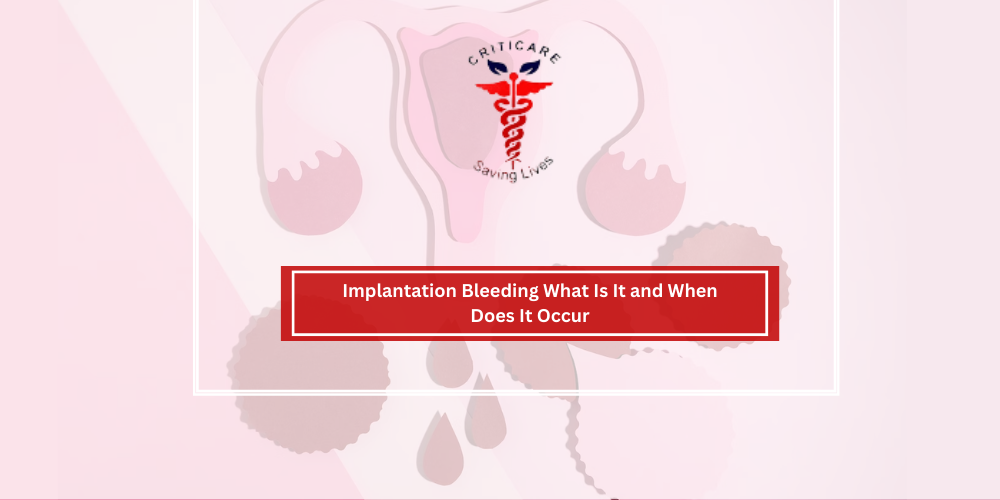Implantation bleeding typically occurs around 10 to 14 days after conception, which is also around the time a woman would expect her menstrual period. It’s a very light spotting or bleeding that happens when the fertilized egg (blastocyst) attaches to the uterine lining
Although this type of bleeding is usually harmless and may be a sign of a healthy pregnancy, it can be confusing and worrying for those who experience it. In this blog post, we will explore implantation bleeding in detail, including its causes, symptoms, and when to seek medical attention.
Whether you are actively trying to conceive or simply curious about this phenomenon, read on to learn more about implantation bleeding and what it means for your pregnancy.
What is implantation bleeding?
Implantation bleeding is a light spotting or bleeding that occurs when a fertilized egg implants itself into the lining of the uterus. This phenomenon usually occurs around 6 to 12 days after conception and is considered an early sign of pregnancy.
During implantation, the fertilized egg burrows itself into the thick lining of the uterus, causing small blood vessels to break and resulting in mild bleeding or spotting.
This bleeding can last for a few hours or up to a few days, and the amount of blood may vary from woman to woman.
One of the distinguishing characteristics of implantation bleeding is its color. Unlike menstrual blood, which is typically bright red and heavy, it is usually light pink, brownish, or even black.
Additionally, it is usually much lighter than a regular period and may not require the use of pads or tampons. Some women may also experience mild cramping or lower abdominal pain during bleeding, but this is not always the case.
When does implantation bleeding occur?
It occurs during the early stages of pregnancy, typically around 6 to 12 days after conception. This is when the fertilized egg implants itself into the lining of the uterus, causing small blood vessels to break and resulting in mild bleeding or spotting.
Women may expect to experience bleeding as early as one week before their expected period, or as late as a few days after their missed period.
However, not all women experience implantation bleeding, and some may only notice a few drops of blood or spotting.
It is typically lasts for a few hours to a few days, and the amount of bleeding may vary from woman to woman.
Signs and symptoms
In addition to light spotting or bleeding, some women may also experience other symptoms during bleeding. These symptoms can include:
- Mild cramping or lower abdominal pain
- Breast tenderness or soreness
- Nausea or vomiting
- Fatigue or exhaustion
- Mood swings or changes in mood
When to see a doctor
It is generally considered a normal and harmless part of early pregnancy, there are certain circumstances in which you should seek medical attention. Here are some reasons to see a doctor if you experience implantation bleeding:
1). Heavy bleeding: If you experience heavy bleeding or bleeding that is equivalent to a heavy period, it is important to seek medical attention. Heavy bleeding may be a sign of a more serious condition such as an ectopic pregnancy or miscarriage.
2). Severe cramping: Mild cramping is common during implantation bleeding, but severe cramping or abdominal pain could be a sign of a more serious condition and should be evaluated by a healthcare provider.
3). Fever or chills: If you experience a fever or chills along with bleeding, it could be a sign of an infection and should be evaluated by a healthcare provider.
4). Previous miscarriage: If you have a history of miscarriage or other pregnancy complications, it is important to seek medical attention if you experience any bleeding during pregnancy.
Treatment and management
In most cases, it does not require medical treatment and will resolve on its own within a few days. However, there are some self-care measures that you can take to help manage the symptoms of implantation bleeding:
1). Wear a panty liner: Use a panty liner to help manage any light bleeding or spotting.
2). Rest: Get plenty of rest and avoid strenuous physical activity.
3). Stay hydrated: Drink plenty of water to stay hydrated.
4). Avoid sexual intercourse: Avoid sexual intercourse until the bleeding has stopped to reduce the risk of infection.
5). Monitor your symptoms: Keep track of your symptoms and report any changes or concerns to your healthcare provider.
In some cases, medical treatment may be necessary to manage implantation bleeding. Here are some medical treatment options that may be recommended by your healthcare provider:
1). Hormonal therapy: Your healthcare provider may prescribe hormonal therapy, such as progesterone, to help regulate hormonal levels and reduce bleeding.
2). Surgery: In rare cases, surgery may be necessary to treat complications such as an ectopic pregnancy or miscarriage.
3). Antibiotics: If the bleeding is caused by an infection, antibiotics may be prescribed to help clear the infection and prevent further complications.
Conclusion
Implantation bleeding is a common and normal part of early pregnancy that occurs when the fertilized egg implants in the uterine lining.
It is usually light spotting and can be differentiated from menstruation by its timing, duration, and characteristics. While implantation bleeding is generally considered harmless, it is important to seek medical attention if you experience heavy bleeding, severe cramping, fever, or chills, or have a history of miscarriage or other pregnancy complications.
If you need medical attention for implantation bleeding or any other pregnancy-related concern, Criticare Hospital is one of the best hospitals in Lucknow to seek care. Our team of experienced and compassionate healthcare professionals is dedicated to providing the highest quality care for you and your growing family.
Contact us today to schedule an appointment or to learn more about our services.
Frequently Asked Questions
How long does implantation bleeding last?
Implantation bleeding can last a few hours or a few days. If it lasts more than three days, you should consult your fertility specialist.
Is implantation bleeding common?
Yes, implantation bleeding is common, and about 25% of pregnant women experience implantation bleeding.
Will a pregnancy test be positive during implantation bleeding?
Your body doesn’t release (human chorionic gonadotropin) HCG hormone after implantation is complete. If you take a pregnancy test soon then it might give you a negative result.
What week of pregnancy is implantation?
During Weeks 3rd- 4th the implantation takes place. This means a fertilized egg moves through the fallopian tubes toward your uterus and attaches to its inner lining.
Are there any signs of failed implantation?
If you haven’t experienced any signs of successful implantation like cramps, sensitive breasts, bloating, or nausea then it may be an indication of failed implantation.




